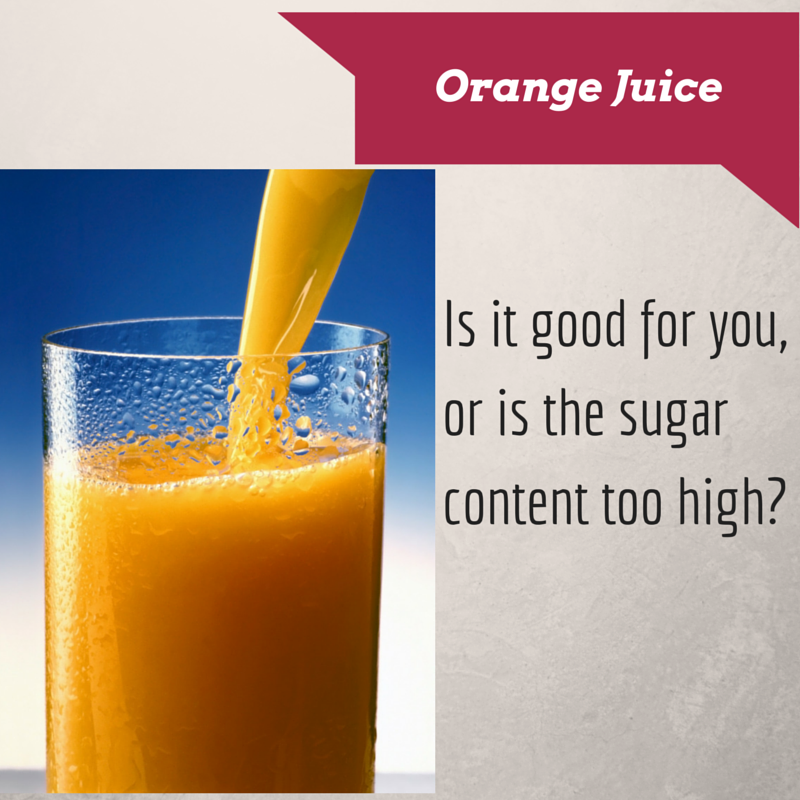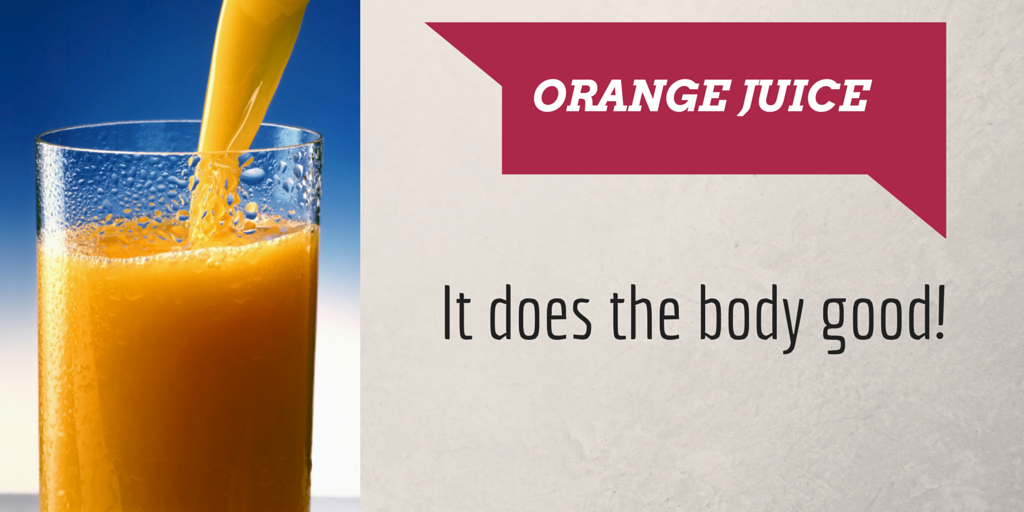
There are studies showing correlation between the consumption of sugared beverages and childhood obesity or adult onset diabetes. In fact, there are even physicians claiming that these studies are reason to reduce the consumption of all drinks containing sugar, including fruit juices.
So why do I suggest orange juice as a good source of nutrition to promote health and metabolism?
I am not going to go into the details, but what I will say is that while the studies regarding sugared beverage consumption and its coincidence with disease are good and offer valuable information, the conclusion that it is the sugar specifically in the beverages is not proven by the data. Now, even if this was the case and sugar was the culprit, the idea that all the sugar in fruit juice is the same has not been sufficiently studied. However, the studies that do exist would suggest that 100% fruit juice does not have the same effect as beverages with sugar added. The idea that fruit juice in the diet would produce similar diseases cannot be derived from the studies used by the physicians who claim that juice is dangerous. In fact, it would be easier to use those studies to hypothesize the opposite relationship.
In the studies measuring sugared beverage consumption(1), the population is divided into two groups: those who drink beverages that have sugar added and those who do not. The individuals who drank sugar-added beverages had a higher disease rate. 100% fruit juice does not have added sugar. In essence, this means you could drink a gallon of orange juice a day and, as long as you did not drink beverages with sugar added, you would be grouped with the population which has a lower disease rate. One could even say it is likely that drinking juice instead of soda has a protective effect. This assumption, while more accurate, is not able to be shown with the data either. However, there are other studies which have drawn such conclusions(2-4).
Is it true that orange juice spikes blood sugar and is as void of nutrition as soda?
The short answer is no. The nutritional content of orange juice is far from low, and while the sugar is about that of a soda, it is naturally occurring and is delivered with important minerals. These minerals in turn allow for the more efficient use of the sugar and thus promotes a healthy metabolism of blood sugar. A 12 ounce serving of orange juice is not only delicious and satisfying, it would also take a whole lot to overdo it. If you were to drink four such glasses a day, a total of 48 ounces, you would only consume 600 calories. For someone consuming 2000 calories a day, that would only make up about 30% of your total calories. To be honest, drinking half that amount is pretty average for many people I know.
Now, I am not suggesting everyone begin chugging orange juice all day. I only want to make the point that it would be an odd case in which someone was able to comfortably consume enough orange juice to really cause a problem in their diet. In actuality, 32 oz. of orange juice would provide 56% of your daily intake of potassium and 28% of your needed magnesium. These two minerals are crucial for healthy metabolism and are difficult to get in sufficient quantities. It also delivers a good portion of your daily need for other nutrients, including 12% of your calcium, 20% of your required vitamin B6, 60% of your daily thiamin, and all the vitamin C you would need in a day. It has been shown that fruit juice consumption increases the nutrient content of a diet on average(5).
What kind of orange juice you consume does make a difference, and it’s not just about organic or non-organic. The closer to fresh squeezed and pulp free you can get, the better. Orange juice should separate on a shelf, it should be sweet and not too acidic, and it is also important to find one that can fit your budget. Also, good orange juice delivers an affordable source of nourishment, even when comparing it to the price of other fruits of a similar nutritional value.
So the stories that identify fruit juice, and specifically orange juice, as a source of empty calories which causes metabolic disfunction and disease have a factual context similar to Puff the Magic Dragon. In fact, drinking orange juice appears in studies to not only increase the nutritional content of the diet but protect against obesity and type two diabetes (6). So, please, drink to your health and enjoy your fruit in a cup!
SPECIAL EVENT
I would love it if you would join us on December 10th for my first-ever presentation of Managing Daily Stress in my home city of St. Louis. I have conducted this workshop at several locations out of state, but I’m very excited to finally be presenting it here!
It will be held at Nebula Coworking from 6-8pm and only costs $20 to attend. You can get your tickets through the Eventbrite event page below and easily add it to your Google, Outlook, Yahoo or iCal calendar right from the site after you sign up. Read more about it (and a bonus special offer!) here on my blog OR get your tickets @ managingdailystress.eventbrite.com
Referenced studies:
(1) Sugared beverage consumption correlated various diseases<
http://www.ncbi.nlm.nih.gov/pmc/articles/PMC2862465/
(2) Soft drink but not juice associated with diabetes
http://www.ncbi.nlm.nih.gov/pubmed/22917499
(3) Fruit juice consumption and coincidence of obesity
http://www.ncbi.nlm.nih.gov/pubmed/21677126
(4) Diabetes in Fruit juice vegetable juice and soft drink consumption
http://www.ncbi.nlm.nih.gov/pubmed/22917499
(5) Increase nutrient content of diet
http://www.ncbi.nlm.nih.gov/pubmed/22443678
(6) Orange juice associated with increased nutritional quality reduced obesity and biomarkers of metabolic disorder
http://www.nutritionj.com/content/11/1/107
Additional related studies:
Fruit juice does not adversely effect fasting glucose, insulin or glucose metabolism
http://journals.plos.org/plosone/article?id=10.1371/journal.pone.0095323
Orange juice does not produce increased endotoxin
http://www.ncbi.nlm.nih.gov/pmc/articles/PMC2858203/
Fructose and orange juice don’t increase ROS compared to glucose
http://www.ncbi.nlm.nih.gov/pubmed/17384340
Orange juice consumption over extended period of time reduces atherosclerotic (heart disease risk) profile
http://www.ncbi.nlm.nih.gov/pmc/articles/PMC3217928/








3 Comments